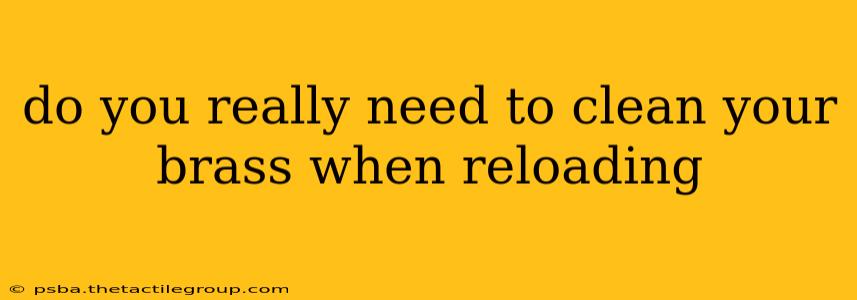The question of whether you really need to clean your brass when reloading is a common one among reloaders, sparking debates in forums and at shooting ranges. The answer, as with many things in reloading, isn't a simple yes or no. It depends on several factors, including the type of ammunition you're reloading, your reloading goals, and your available resources.
Factors Influencing the Need for Brass Cleaning
Several key factors determine whether cleaning your brass is necessary or even beneficial before reloading:
1. Ammunition Type:
-
Pistol Calibers: Generally less demanding. The lower pressures involved often mean less fouling buildup, making cleaning less crucial. Many reloaders successfully reload pistol brass multiple times without cleaning, especially with relatively clean-burning powders.
-
Rifle Calibers: Typically require more attention. Higher pressures and hotter burning powders can leave more fouling, potentially affecting case life and the consistency of your reloads. Cleaning is often recommended, particularly with magnum calibers.
2. Reloading Goals:
-
Casual Reloading: For occasional shooting or plinking, the need for meticulous cleaning is reduced. You might find that a simple tumbling process is sufficient to remove most debris.
-
Precision Reloading: If you're pursuing accuracy in competitive shooting or hunting, cleaning your brass is highly recommended. Even microscopic amounts of fouling can negatively impact case dimensions and potentially your accuracy.
-
Volume Reloading: Cleaning large volumes of brass can be time-consuming. In these cases, prioritization based on caliber and perceived fouling is key. Some reloaders opt for a less rigorous cleaning process for high-volume reloading.
3. Brass Condition:
-
New Brass: Generally cleaner and requires less cleaning, although a quick tumble may be beneficial to remove any manufacturing residues.
-
Range Picked Brass: More likely to contain significant amounts of fouling, corrosion, and debris. Thorough cleaning is generally necessary. Pay close attention to any signs of damage before reloading.
4. Powder Type:
Some powders are known for producing less fouling than others. If you’re using a cleaner-burning powder, you might find that you need to clean your brass less frequently. Researching the properties of your chosen powder is essential.
Cleaning Methods and Their Effectiveness
There are various ways to clean brass, each with its own pros and cons:
1. Tumbling:
This is a popular and relatively quick method. Using a rotary tumbler with media and a cleaning solution removes dirt, carbon, and some fouling. It's generally suitable for less demanding applications.
2. Ultrasonic Cleaning:
Provides a more thorough clean, removing more stubborn fouling and debris. It's quicker than hand-cleaning for larger batches but can be more expensive upfront.
3. Hand Cleaning:
This time-consuming method involves using brushes and solvents to clean each case individually. It’s the most thorough but least efficient for large volumes of brass.
The Bottom Line: When to Prioritize Brass Cleaning
While not always strictly necessary, cleaning your brass before reloading offers several potential benefits:
- Improved Case Life: Removing fouling can extend the life of your brass, saving you money in the long run.
- Enhanced Accuracy: A cleaner case contributes to more consistent dimensions and potentially better accuracy.
- Reduced Risk of Damage: Removing corrosive fouling protects your reloading equipment and prevents potential damage.
Ultimately, the decision of whether or not to clean your brass is a personal one based on your individual circumstances and priorities. For high-volume, casual reloading of pistol calibers, skipping a thorough cleaning might be acceptable. However, for precision reloading or when using rifle calibers with potentially corrosive powders, cleaning your brass should be a priority. Weigh the factors discussed above, experiment with different cleaning methods, and decide what approach best fits your needs and budget.

